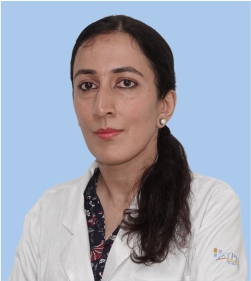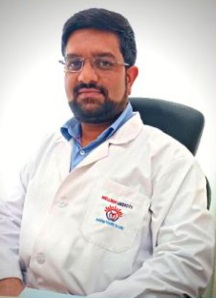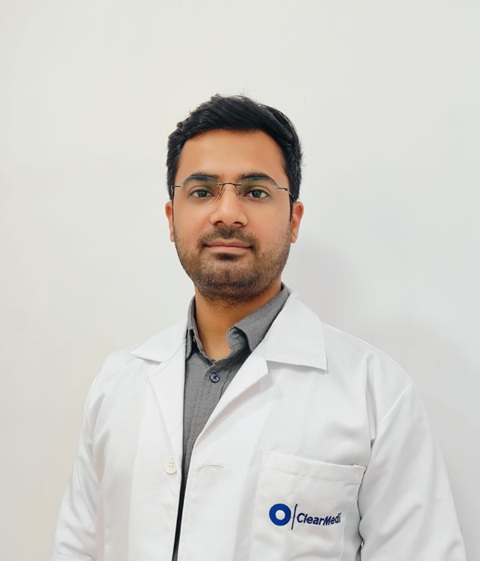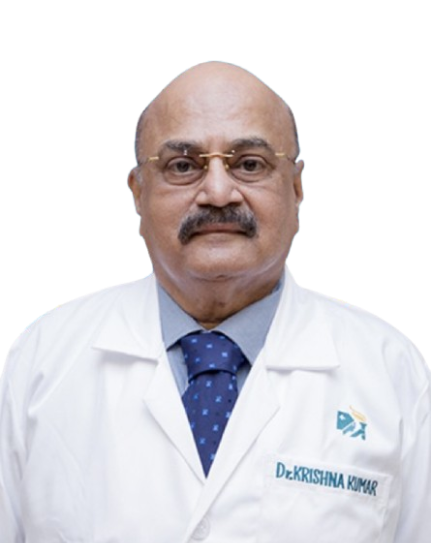Partial Thyroidectomy Surgery: Procedure, Side Effects, Results

Treatment Duration
60 Minutes
------ To ------90 Minutes
Treatment Cost
₹ 40,000
------ To ------₹ 80,000

Table of Contents
- Anatomy and Physiology of the Thyroid Gland
- Conditions treated with Partial Thyroidectomy
- How is Partial Thyroidectomy performed?
- What to expect before and on the day of the Partial Thyroidectomy?
- What to expect after Partial Thyroidectomy?
- When to consult a doctor for partial thyroidectomy?
- What will happen if surgery is delayed?
- Cost of Partial Thyroidectomy
Partial Thyroidectomy is the surgery performed to remove a part of the thyroid gland. Partial thyroidectomy is done to manage the overactivity of the thyroid gland or to prevent the spread of thyroid tumours by removing the majority of the gland. The amount of the thyroid gland removed depends upon the severity of the condition to be treated.
|
Procedure Name |
Partial Thyroidectomy |
|
Conditions Treated |
Thyroid cancer, Goitre, Suspicious Thyroid Nodules, Overactive Thyroid |
|
Benefits of Surgery |
Minimally Invasive, Less Recovery time, Good Prognosis |
|
Treated By |
ENT Surgeon |
You can check Partial Thyroidectomy Surgery Cost here.
Anatomy and Physiology of the Thyroid Gland
The thyroid gland, an endocrine gland, is located in the front of the neck and is present under the larynx and on the trachea. Endocrine glands are the glands that release hormones directly into the blood. The thyroid hormones exert their effects on almost all the cells of the body and increase their metabolism and function. For example, it increases cardiac output, heat production, and oxygen consumption. It also enhances the respiratory rate, wakefulness, alertness, and responsiveness.
Expert Doctors (10)
NABH Accredited Hospitals (10)


Conditions treated with Partial Thyroidectomy
The doctor may recommend Partial Thyroidectomy in the following conditions:
- Thyroid cancer: Cancer is the most common cause of thyroidectomy, whether partial or complete. A partial thyroidectomy is done if the cancer is in its initial stage and has not started spreading.
- Goitre: The thyroid gland enlarges and becomes swollen in this condition. If the goitre is causing difficulties in day-to-day life, then partial thyroidectomy reduces the symptoms.
- Suspicious thyroid nodules (tumour): In some cases, the thyroid nodules can not be identified as cancerous or non-cancerous. In these cases, the doctors decide to remove the thyroid gland as a preventive measure.
- Overactive thyroid (hyperthyroidism): When the hyperthyroidism is not managed through the medicines, the surgeon may advise the patent to undergo partial thyroidectomy.
How is Partial Thyroidectomy performed?
Thyroidectomy is performed through the following approaches:
- Conventional Approach: The surgeon, in this approach, makes an incision at the neck to expose the thyroid gland. This procedure is performed in most candidates for thyroidectomy.
- Endoscopic Thyroidectomy: During the endoscopic thyroidectomy, the surgeon makes a small incision and inserts an endoscope to evaluate the thyroid gland to locate the part of the thyroid gland to be removed. Once located, small holes are made to insert the instruments, and the part of the thyroid gland is removed.
- Transoral Thyroidectomy: The surgeon reaches the thyroid gland by making an incision in the oral cavity. That eliminates the neck incision and the resulting risk of the scar.
The anesthesiologist will inject the patient with an appropriate dose of anaesthesia. It helps in keeping the patient unconscious during the surgery.
- The surgeon makes an incision at the centre of the neck. Then the parts of the thyroid gland are removed using a suitable probe.
- The doctor may also remove the nearby lymph nodes if a partial thyroidectomy is performed to treat cancer. It is also done to prevent the spread of cancer.
- One or more drainage tubes may be inserted into the area incised to drain the extra fluid from the surgery site in the thyroid gland.
- After completion of the surgery, the cuts may be closed either by using stitches or by using surgical glue.
What to expect before and on the day of the Partial Thyroidectomy?
Before Partial Thyroidectomy
- Before going for the surgery, the doctor will order diagnostic tests like ultrasound, thyroid scan, and MRI scan. These tests may help in viewing the thyroid gland in a better way. For example, imaging tests show a clear view of the underlying tissues and the muscles. In addition, it shows any benign or cancerous growth in the thyroid gland.
- The doctor may ask you for all your medical history and the list of medicines you are taking, including any herbal supplements.
- Blood tests are performed to check the amount of thyroid hormone and calcium in the body.
- The doctor will ask you to stop taking medicines like anticoagulants and aspirin.
- Medicines will be given to lower the thyroid secretion before the surgery.
- Also, the surgeon will ask you not to eat anything after midnight on the day of the surgery. However, you can take the medicines prescribed by the doctors that need to be taken before the procedure.
On the day of Surgery
- The hospital staff will already provide you with the schedule to be followed on the day of the surgery.
- Try to reach the hospital before the time of the surgery.
- Upon arriving at the hospital's premises, the staff will ask you to fill out the patient's admission form. They will also request you sign a consent form for the surgery.
- Then the hospital staff will ask you to change into the gown provided by the hospital.
- The staff will tie a band on the wrist of the patient. This band includes the name of the patient along with the name of the procedure for which he/she has come.
- Leave all your belongings like jewellery and other wearables like watches and piercings at home.
- Do not wear makeup and cosmetic lotions when you are coming for surgery.
- Do not forget to take a bath before leaving for the hospital.
- The patient is injected with an IV infusion on the arm before shifting to the operation theatre.
During the Surgery
- The whole surgery is done under general anaesthesia. So you will not feel any type of pain or any other sensation during the surgery.
- The cuts are made in the creases of the skin, where the scars are not visible after the wound heals.
- The whole procedure of partial thyroidectomy may take around 2 to 3 hours to complete. However, the time of the surgery may vary depending upon the severity of the condition and the extent of the thyroid gland to be removed.
- All the vitals of the patients, like heart rate, blood pressure and oxygen level, are monitored continuously during the surgery.
- A tube is also inserted into the patient's throat to assist in breathing.
What to expect after Partial Thyroidectomy?
After the Surgery
- After the completion of the surgery, the patient is shifted to the recovery ward. There all the vital signs of the patient, like heart rate, breathing, and blood pressure, are monitored continuously until the patient regains consciousness.
- You can expect a bandage around your neck after the partial thyroidectomy.
- Consult the doctor if you have breathing or swallowing problems due to the presence of the bandage (dressing) around your neck.
- The doctor will provide some medicines to lower the thyroid hormone level in the body. You will also be prescribed painkillers to ease the pain after the surgery.
- Radioactive iodine may also be given to the patient. It is given because the radioactive iodine kills the left-out cancerous cells.
- The patient may be asked to do deep breathing. It will help in opening the air passage and also prevents lung infections. Take ten deep breaths every hour when you are awake and free.
First follow-up appointment
- At the first follow-up, the doctor will physically examine the thyroid gland.
- The surgeon will recommend blood tests to check the level of TSH suppression in the person's blood.
- In the case of cancer, the patient is asked to visit every three months for the first two years.
- For the next two years, the patient is asked to visit at an interval of 6 months.
- If the partial thyroidectomy is done for goitre, the patient is asked to visit at six months.
When to consult a doctor for partial thyroidectomy?
Partial Thyroidectomy is a comparatively safer technique, but there are some chances that complications can occur. Therefore, if any complications like these occur, it is time to see a doctor.
- Bleeding
- Infection
- Difficulty in urinating
- Obstruction in the airway caused by bleeding
- Hoarse voice (this may be due to nerve damage)
- Low level of parathyroid hormone in the body
- Fluctuation in the level of thyroid hormone
What will happen if surgery is delayed?
If the thyroid surgery is delayed, it may lead to the following complications:
- Increased thyroid hormone level in the body (if the treatment is to be done for goitre).
- Trouble in swallowing
- If there are cancerous tumours in the thyroid gland, then it may damage the voice box. It may result in hoarseness of voice.
- If the cancerous tumours are not removed on time, they may also spread to other parts of the body. As the disease progresses, the patients may experience a lump in the throat. The other symptoms include difficulty swallowing, hoarseness in voice, and pain in the neck.
Cost of Partial Thyroidectomy
The cost of Partial Thyroidectomy ranges from ₹40,000 to ₹80,000. The cost varies based on the following factors:
- Type of Thyroidectomy Surgery
- Age of the patient
- The medical condition of the patient
- The type of hospital facility availed - individual room or shared.
| Procedure Name | Cost Value |
| Partial Thyroidectomy | ₹40,000 to ₹80,000 |
Frequently Asked Questions (FAQ)
What are some Myths and Facts about Partial Thyroidectomy?
- Myth: Prolonged hospitalisation is necessary after thyroid surgery.
Fact: In most cases, patients underwent partial thyroidectomy are discharged within 1-2 days after the procedure. However, if there are post-operative complications, the patients can be hospitalised during recovery. - Myth: After completing the partial thyroidectomy, you will not be able to lead a healthy life.
Fact: After completing the partial thyroidectomy, the patients were found to be more comfortable in their life. There is a little discomfort in the initial days, but it decreases as the surgical wound heals.
More Treatment options
Last Updated on: 15 November 2022
Author
HexaHealth Care Team
HexaHealth Care Team brings you medical content covering many important conditions, procedures falling under different medical specialities. The content published is thoroughly reviewed by our panel of qualified doctors for its accuracy and relevance.






















